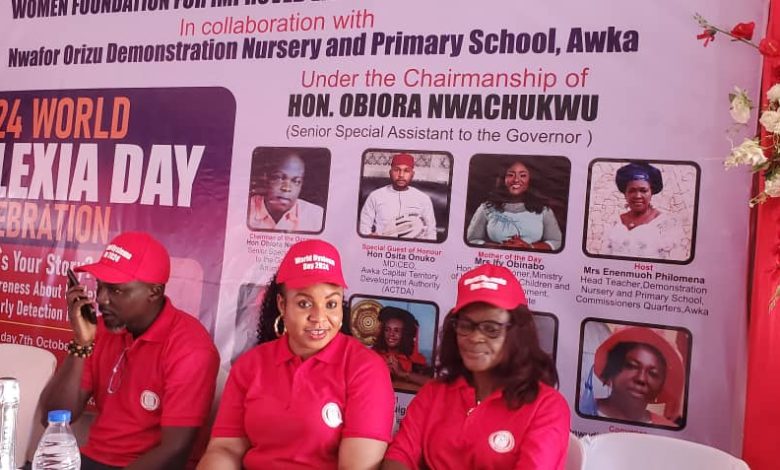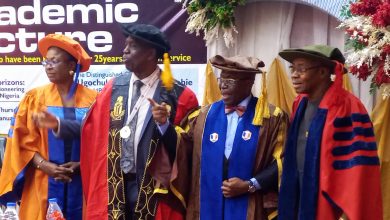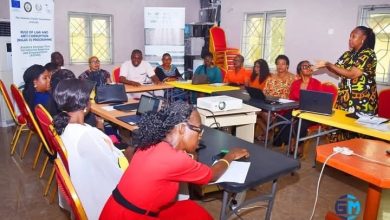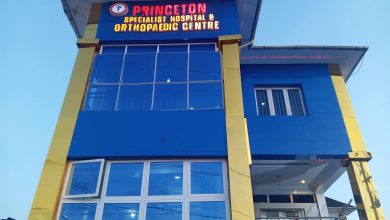
By Tony Okafor
Renowned education expert Prof Ifeoma Udoye has urged parents, teachers, and policymakers to intensify efforts to support individuals with dyslexia, stressing that early intervention and inclusive education are crucial to unlocking their full potential.
Udoye made the call during her keynote address at the 2024 World Dyslexia Day event organized by Komen Foundation for Improved Living Standards and Nwafor Orizu College Demonstration Nursery and Primary School.
Udoye urged early intervention, stating that up to 70% of at-risk children who receive educational intervention in kindergarten or first grade become proficient readers.
She encouraged parents to monitor linguistic growth and watch for signs of dyslexia, provide supportive environments, and avoid labeling or stigmatizing dyslexic children.
Teachers were advised to provide structured literacy teaching, focus on individual strengths, and use assistive technology. “Dyslexia can be a source of strength, fostering resilience and creativity,” Prof Udoye concluded. “Let’s create inclusive spaces where everyone can thrive.”
According to Udoye, 1 in 5 children may have dyslexia, and early intervention is crucial.
She emphasized that dyslexia affects boys and girls equally, and that inclusive education and support are essential.
The event aimed to raise awareness, promote understanding, and celebrate the strengths of individuals with dyslexia.
Prof Udoye called on attendees to join the conversation using #WorldDyslexiaDay, share their experiences, support those struggling, and promote inclusivity.
Udoye shared her inspiration for researching dyslexia, stating,”Growing up, I saw firsthand the struggles of friends and family members with dyslexia. I wanted to make a difference
She hopes readers take away the message that dyslexia is not a limitation, and that with support and understanding, individuals with dyslexia can thrive.
To get involved, Udoye encourages readers to share their story, volunteer with dyslexia organizations, and advocate for inclusive education.
Dr. Ndidi Onuigbo, a renowned expert, in her lecture emphasized the need for greater awareness and support for children with dyslexia at the 2024 Dyslexia Awareness Forum organized by Women Foundation for Improved Living Standards (WOFILS).
Dyslexia, a learning disorder affecting approximately 20% of Nigeria’s population, according to Dyslexia Help Africa, hinders individuals from learning words, reading, writing, or understanding others due to phonological deficits ¹. This condition often leads to stigmatization, with many regarding dyslexic children as having low IQ or being dullards.
Dr. Onuigbo highlighted the importance of understanding dyslexia’s causes, signs, and symptoms to develop effective interventions. She explained that dyslexia results from the brain’s inability to translate images into understandable language, not from vision or hearing problems, mental retardation, or lack of intelligence.
The forum aimed to educate teachers, parents, and curriculum planners about dyslexia, enabling them to provide supportive environments and evidence-based interventions. Dr. Onuigbo emphasized the need for inclusive education, citing the recent bill adopted by Nigerian lawmakers to implement global standards on national policy of education.
Through awareness and patient guidance, Dr. Onuigbo believes that dyslexic children can overcome educational barriers and thrive. WOFILS seeks to spark a national conversation, promoting literacy development and inclusive practices.
In his presentation, Maazi Ezenwanne Obinna, said”Dyslexia is highly genetic and runs in families. A child with one parent with dyslexia has a 30% to 50% chance of inheriting it. Genetic conditions like Down syndrome can also make dyslexia more likely to happen.
“If you have dyslexia, you’re neurodivergent. That means your brain formed or works differently than expected. Research shows people with dyslexia have differences in brain structure, function and chemistry.
“Infections, toxic exposures and other events can disrupt fetal development and increase the odds of later development of dyslexia
“Air and water pollution can increase your risk of developing dyslexia. This is especially true with heavy metals (like lead or manganese), nicotine and certain chemicals used as flame retardants,” Ezenwanne stated




